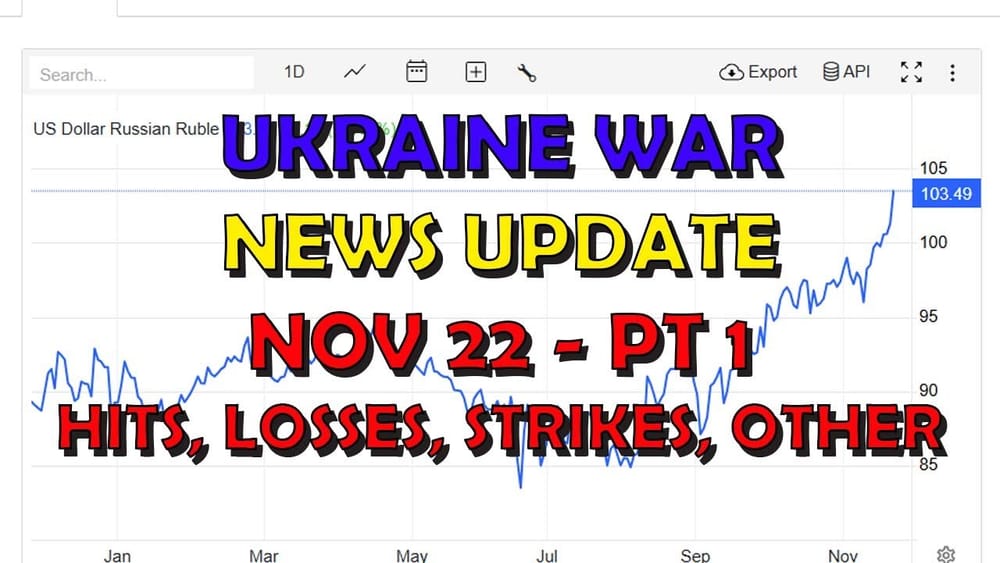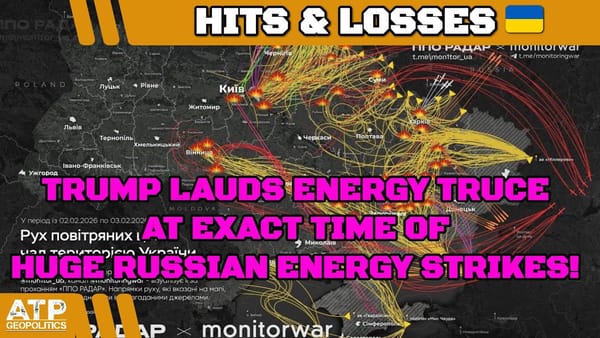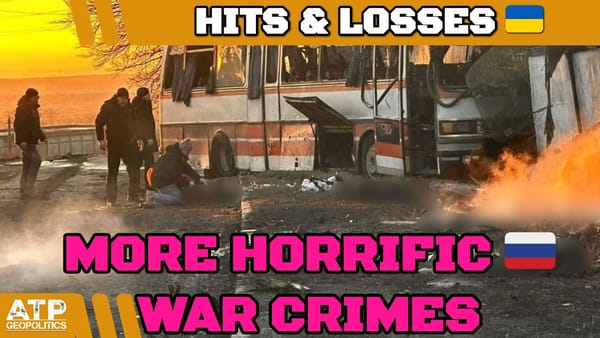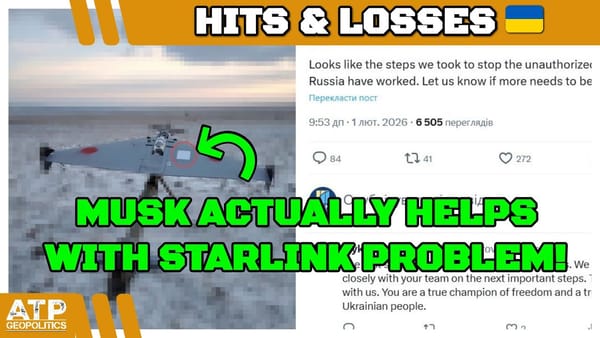Ukraine War Update NEWS: Pt 1 - Overnight & Other News
Table of Contents 📖
"Russia's scare tactics are aimed to cover for the fact that Russia is on the brink of collapsing from the inside."
Hello Team
🎦 00:00-00:04⏩
Jonathan welcomes viewers to a new ATP Geopolitics video, specifically a Ukraine War News Update for the 22nd of November 2024, which will be split into multiple parts.
Return to top⤴️
🪦 DISCLAIMER FOR GENERAL STAFF LOSSES DATA
- These are real people with real lives and real families who love them. Don’t let the numbers sap your humanity.
- These numbers probably aren’t accurate but they’re the best we have and we don’t need them to be accurate to be indicative of patterns of activity.
- All losses are estimates. Losses cannot be counted with accuracy because of the conditions on the ground.
- Both sides would see it to be of their advantage to minimize their own losses maximize the other side’s losses.
- Neither side releases their losses but we have enough transparency from the Ukrainian side to have confidence in they are indicative.
- Personnel losses are hard to count. If a soldier gets injured, heals up, and returns to the front line only to get injured again, is that one loss or two? Also, how to deal with losses from PMC’s or soldiers fighting with RF from occupied territories?
- Equipment losses are hard to count. If an AA complex involves several parts and one part gets disabled, is that a loss, or a fraction of a loss? If a tank gets disabled, repaired, back into the fight, then disabled again, is that one lost tank or two?
- All recorded losses are vulnerable to multiple reporting. We have already seen numerous cases of multiple drones in the air reporting the same loss from different angles as multiple engagements.
- Losses are not always reported on the same day they occurred. It is frequent that drone losses are reported at least 24 hours after other terrestrial equipment losses. Certain losses may not be reported for days or weeks for military intelligence reasons.
Ukrainian General Staff data on Russian losses
🎦 00:04-01:57⏩
- Jonathan reviews the daily figures from the Ukrainian General Staff, noting a significant drop in Russian personnel losses (1,050) compared to the previous days (over 1,600 then 1,500).
- He speculates that weather conditions (cloudy skies, rain, or snow) might be impacting military activity, potentially hindering drone operations.
- Other losses are also lower: 1 tank, 13 armoured personnel vehicles, 5 artillery pieces, 1 multiple launch rocket system, 1 anti-aircraft warfare system, and 32 vehicles and fuel tanks.
- Despite the lower figures, Jonathan points out that over 1,000 personnel losses for the Russians is still substantial and detrimental.
Andrew Perpetua's visually confirmed loss data
🎦 01:58-09:29⏩
- Jonathan analyses visually confirmed loss data from Andrew Perpetua, covering two days' worth of figures.
- He highlights the difference between the visually confirmed figures and the General Staff's reports, suggesting a roughly 3:1 or 4:1 ratio in favour of Ukraine for overall losses.
- Combat asset losses are relatively equal.
- Jonathan observes that the discrepancy is mainly due to trucks, ATVs, and civilian vehicles, which constitute a large portion of Russian losses.
- Ukrainian Losses (2 days ago):
- 1 boat
- 2 artillery pieces
- 3 tanks
- 3 infantry fighting vehicles (2 Bradleys destroyed, 1 damaged)
- 5 APCs (including a Senator M113)
- 9 MRAPs (mostly Kozaks)
- Several artillery systems (including a TOS-1A damaged)
- Around 10 tanks (including a T-90M)
- 5 infantry fighting vehicles
- 7 APCs
- Numerous trucks, ATVs, and civilian vehicles
- Russian Losses (2 days ago):
- 91 personnel
- No MRAPs
- Numerous trucks, ATVs, and civilian vehicles
- Ukrainian Losses (yesterday):
- 1 excavator
- 1 N777 howitzer damaged
- 2 other howitzers
- 3 tanks (2 destroyed)
- 1 Bradley destroyed
- 2 BMP/BTRs
- 1 M113 destroyed
- 1 VAB destroyed
- 1 unidentified AFV
- 1 MRAP
- Russian Losses (yesterday):
- 121 personnel
- 2 BM-21 Grads
- 1 multiple launch rocket system abandoned
- 2 multiple launch rocket systems damaged (by FPV drones)
- 4 tanks
- 12 infantry fighting vehicles (mostly destroyed or abandoned)
- 4 MTLBs
- 2 MRAPs
- Numerous civilian vehicles, ATVs, and trucks
- Jonathan notes the increasing use of civilian vehicles in frontline operations, reflected in the high number of losses.
- He also points out the prominence of "Vampire" drones (Baba Yagas) and other larger drones like Punisher drones in destroying Russian equipment.
- Jonathan expresses his appreciation for Andrew Perpetua's work and the detailed information provided, including amusing entries like "Identity crisis" for an unidentified vehicle.
North Korean General injured in Kursk strike
🎦 09:29-10:03⏩
- Reports indicate that a senior North Korean general was injured in Ukraine's recent Storm Shadow missile strikes on Kursk.
- This is reportedly the first instance of a high-ranking DPRK military figure being wounded in the war, according to the Wall Street Journal.
- The strikes targeted a suspected command and control bunker in Kursk, with rumours suggesting the presence of North Korean personnel.
- Jonathan takes a tea break.
Wagner Group suffers losses in Mali
🎦 10:05-11:25⏩
- Several Wagner Group mercenaries have been killed in Mali, likely in an ambush by Tuareg rebels in the Mopti province.
- Jonathan connects this to the Ukraine war, explaining that Russia's activities in Africa, including gaining influence and access to resources, are aimed at funding the war effort.
- He emphasises that Russia seeks influence and resources globally to support its war project in Ukraine.
Overnight Missile Strikes and Explosions
🎦 11:27-13:40⏩
- No information available on overnight missile launches into Ukraine, potentially indicating a quiet night.
- An explosion reported in Dnipro city, possibly caused by an Iskander ballistic missile strike (according to Skyquartz). This follows yesterday's strike on Dnipro by a suspected RS-26 ICBM/IRBM.
- Krivi Rih was also hit yesterday, resulting in 32 casualties (including 2 children), with 12 still hospitalised and 2 in serious condition.
- Jonathan expresses concern about the vulnerability of cities like Krivi Rih, Zaporizhia, and Dnipropetrovsk due to their proximity to the front line, making them frequent targets of missile attacks.
- Sumy, in northern Ukraine, was also attacked by kamikaze drones equipped with shrapnel, resulting in 2 deaths and 12 injuries.
- Jonathan highlights the "double war crime" aspect, with Russia deliberately targeting civilians and using shrapnel to maximise casualties.
Escalation vs Retaliation and Ukraine's actions in Russia
🎦 13:40-16:27⏩
- Jonathan challenges the narrative of "escalation" regarding Ukraine's strikes on Russian territory, arguing that it is "retaliation" for Russia's actions.
- He contrasts the 14,000 missiles fired by Russia into Ukraine with the limited number of strikes by Ukraine on military targets in Russia.
- Jonathan criticises the mainstream media for adopting the Russian narrative of escalation and stresses the importance of correcting this misrepresentation.
- He highlights the different nature of Ukrainian strikes, which focus on military objectives, compared to Russia's frequent targeting of civilians and infrastructure in Ukraine.
- Jonathan condemns Russia's actions as genocide and terrorism, emphasising the need to remind people of the deliberate targeting of civilians and the use of shrapnel munitions.
Strike in Krasnodar and Storm Shadow strike details
🎦 16:30-17:53⏩
- Ukraine reportedly struck a target in Krasnodar, with pictures showing a large fire. The exact location and nature of the target are unclear, but local channels suggest it might be near the Jablonski Bridge.
- More details emerge about the Storm Shadow missile strike on a command post in Marina, Kursk region, on November 20th.
- According to reports, 18 soldiers were killed, and 33 were injured (including 3 North Koreans).
- An explosion later injured 13 more soldiers from the 88th Sapper Regiment, potentially related to the presence of Lieutenant General Solodchuk at the site.
- Jonathan reiterates the report from the Wall Street Journal about a senior North Korean general being wounded in the Kursk strike.
- Due to an increased threat of missile attacks, the Vukovna radar meeting has been cancelled. Rumours suggest Russia might target the Ukrainian parliament (the Rada).
- The Rada Services Committee secretariat is not working, and staffing levels have been minimised in other government bodies like the Prosecutor General's office.
Potential attack on Rada and risk reduction hotline
🎦 17:53-19:10⏩
- Jonathan questions why Russia hasn't targeted key political and cultural sites in Ukraine like the Rada or the President's residence, wondering about the reasons behind this restraint.
- Russia claims it notified the US via the nuclear risk reduction hotline 30 minutes before launching the missile that struck Dnipro.
- However, there are conflicting reports about whether Russia issued any warnings regarding the use of the ICBM/IRBM.
Russian missile strikes on energy infrastructure
🎦 19:12-19:31⏩
- Russia's weekend missile strikes targeted three out of five working thermal power plants owned by DTEK, the Ukrainian power grid operator.
- One of the plants remains offline, highlighting the severity of the damage to the national grid.
Russian Economy: Sanctions, Ruble Collapse, and Chinese Banks
🎦 19:31-22:07⏩
- Chinese banks are tightening controls on payments from India, UAE, and Hong Kong to Russian companies to avoid secondary sanctions.
- This involves increased scrutiny of shipping documents to identify any Russian connection.
- Jonathan views this as positive news, as it hinders Russia's ability to easily receive payments.
- The Russian ruble's value continues to plummet, exceeding 103 rubles to the dollar (previously 101).
- Jonathan anticipates that this will exacerbate inflation and negatively impact Russian consumers, as imports become more expensive.
- Tendar's Analysis of the Russian Economy:
- The ruble is rapidly losing value, similar to the situation at the start of the full-scale war in 2022.
- Russia's previous countermeasure of increasing interest rates might not be as effective this time.
- Further interest rate hikes could further damage the Russian economy and might not prevent the ruble's decline.
- Tendar suggests that this economic instability might force Putin to seek a pause in the war within the next few months.
- He believes the recent missile launch in Dnipro was a scare tactic to distract from Russia's internal economic problems.
- Tendar argues that while the economic situation isn't as dire as during the Soviet Union's collapse, the political situation is similar, with Putin facing increasing pressure.
- He advocates for the West and Ukraine to intensify efforts to weaken Russia economically, including closing sanction loopholes and targeting oil and gas infrastructure.
- Jonathan agrees with Tendar's assessment, emphasizing the importance of economic pressure in winning the war against Russia.
Roman Sheremeta's insights on Russia's economy
🎦 22:07-24:13⏩
- Roman Sheremeta's analysis paints a grim picture of the Russian economy:
- The Russian central bank's resources are nearly depleted.
- Severe labour shortages are affecting 73% of enterprises.
- Factory capacity utilisation is at a record high (over 80%), indicating the economy is operating at its limits.
- This combination of factors could lead to stagflation, a period of slow economic growth and high inflation.
- Rising interest rates increase credit costs, further hindering economic activity.
- Russia's commodity industries are losing access to Western markets due to sanctions.
- Defence factories are operating at full capacity to support the war effort, diverting resources from other sectors.
- GDP growth is slowing despite significant government stimulus, dropping to 3.1% in Q3 (compared to 4.1% in Q2 and 5.4% in Q1).
- The central bank forecasts near-stagnation in the next year, with GDP growth of only 0.5-1% and flat investment and private consumption.
- Jonathan concludes that the economic outlook for Russia is bleak, with serious challenges in the short and long term.
Problems with Soldier Payments in Russia
🎦 24:14-25:26⏩
- Reports indicate that Russia is facing difficulties in paying its soldiers, even as its tightly controlled propaganda machine attempts to downplay the issue.
- The Kommersant newspaper reports that Medvedev, Deputy Chairman of the Security Council, has demanded that problems with payments to soldiers participating in the "special military operation" be resolved.
- Medvedev stressed the importance of timely payments and assistance to soldiers and acknowledged the existence of these problems, suggesting they can be addressed through state and party resources.
- Jonathan highlights the significance of this admission, as it reveals cracks in Russia's ability to sustain its war effort financially.
Disinformation and the Daily Telegraph article on NATO
🎦 25:26-28:04⏩
- Jonathan cautions viewers about disinformation and biased framing in news articles, even from seemingly reputable sources.
- He uses a Daily Telegraph article titled "America's giving up on NATO. Britain is the new reason why" as an example.
- Shashank Joshi, a defence correspondent for The Economist, criticises the article as a misrepresentation of US-EU security cooperation.
- The article suggests that a UK-EU defence pact is being negotiated due to the US potentially appointing someone like Tulsi Gabbard (who has expressed skepticism about NATO) to a key position.
- Jonathan warns against accepting such narratives at face value, encouraging critical evaluation of information and recognizing potential agendas behind certain articles.
- He acknowledges that even publications like the Daily Telegraph, generally pro-Ukraine, can publish misleading pieces.
- Shashank Joshi dismisses the article's claim that Watchkeeper drones are "critically important," noting that the reason for cutting them is precisely that they are not critical.
UK Defence Cuts and the Importance of Supporting Ukraine
🎦 28:04-32:20⏩
- Jonathan revisits the topic of UK defence cuts discussed in a previous video, specifically the decision to stop funding amphibious ships, helicopters, and 46 Watchkeeper drones.
- He explains that the cuts are partly justified because these assets are not as crucial in the context of modern warfare, as demonstrated by the Ukrainian war.
- The need for large reconnaissance drones like Reapers has diminished, and the UK faces challenges in recruiting Marines to operate amphibious ships.
- Jonathan acknowledges the difficult choices governments face in balancing defence spending, Ukraine aid, and domestic needs.
- He argues that supporting Ukraine should be prioritised, as its victory would reduce the need for extensive UK military spending in the future.
- However, he recognises the need to invest in the UK's armed forces and acknowledges the finite nature of resources.
- Jonathan anticipates that some decisions will be unpopular but emphasises the need to make tough choices with limited budgets.
Trolls and the need for effective communication
🎦 32:20-32:41⏩
- Jonathan cautions viewers about trolls on comment threads, highlighting an example of a user who responded to his comment about the half-billion-pound savings from the defence cuts with divisive rhetoric about train driver pay rises and illegal immigrants.
- He points out that the user's use of a decimal point in a large number indicates they are likely not British, further suggesting they might be a troll attempting to sow discord.
- Jonathan emphasises the importance of recognizing and ignoring such attempts to derail discussions.
- He reiterates the challenges all countries face in allocating resources between domestic needs and supporting Ukraine, stressing the need for effective communication from governments about the importance of aiding Ukraine.
- Jonathan encourages viewers to engage in discussions and advocate for Ukraine's cause within their own spheres of influence.
Wrap Up
🎦 32:41-32:41⏩
Jonathan thanks viewers for watching, reminds them to be wary of trolls, and signs off.
Return to top⤴️




